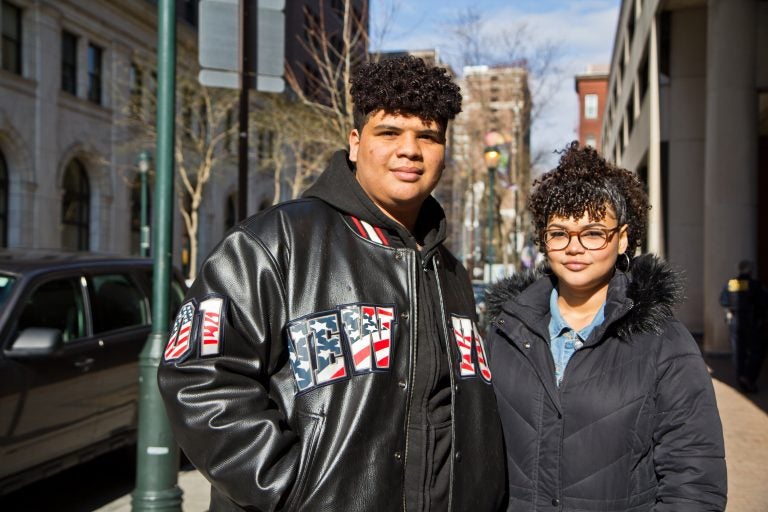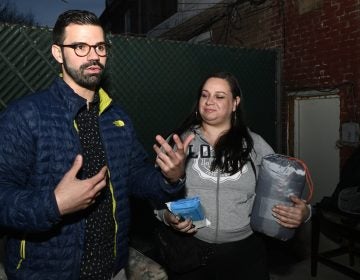National Puerto Rican group meets in Philly to plot the road ahead
The National Puerto Rican Agenda held their second convention at Taller Puertorriqueno in North Philly this weekend to think of ways to mobilize this diaspora.

Puerto Rican evacuees Crisjoel Morales Monet, 17, and Judy Morales Monet, 16, are staying at the Holiday Inn Express in Center City with their mom and oldest brother Friday April 20th. They still don't know where to go next. (Kimberly Paynter/WHYY)
The flood of Puerto Ricans coming to our area after Hurricane Maria might be top of mind for many, but economic turmoil on the island was sending Puerto Ricans to the mainland for many years before the storm hit. The combination of storm and stress means now millions more Puerto Ricans live in the mainland U.S. than on the island.
As Pennsylvania and New Jersey continue to have some of the largest Puerto Rican communities, the National Puerto Rican Agenda held their second convention at Taller Puertorriqueno in North Philly this weekend to think of ways to mobilize this diaspora.
Alicia Strong is a recent college grad living in New Britain, Connecticut. She says it could be a powerful force at the polls. “I’m really interested in motivation of Puerto Rican voters,” said Strong. “Especially in my city, New Britain, where there’s 40 percent Puerto Ricans — we should be able to determine elections. But we have such a low voter turnout that that’s not the case,” she continued.
She says the recent primary election of Alexandria Ocasio-Cortez for New York’s 14th congressional district, was an inspiration for her to start organizing. “It’s really exciting to see someone with my background have a shot,” said Strong, a practicing Muslim who studied the intersection of government and religion at Wesleyan University.
Though all Puerto Ricans are U.S. citizens, only those who live in the 50 states got to vote for president in November 2016. Those living on the island got to vote in the presidential primary and have a non-voting member in Congress.
Anthony Suarez says while the National Puerto Rican Agenda wants to focus on the needs of all Puerto Ricans, those on the mainland come first for him, “I can’t begin to worry about Puerto Rico, but I can worry about Puerto Ricans,” he said.
In the 90s, Suarez was the first Puerto Rican assemblyman in Florida and now he directs a legal clinic in Orlando Florida with the Puerto Rican Bar Association. His organization is one of the 10,000 groups and individuals that make up the agenda’s membership. In its third year, the convention worked on identifying political goals important to the diaspora. Suarez is focused on the legal needs of migrants fleeing the devastation of Hurricane Maria.
“Everyone needed to move quickly from the island,” said the New Jersey native, “Well this resulted in mothers separated from the fathers and all of a sudden you have a custody issue and that is the most common problem. Then they come here with very limited resources — soon they run out of money and now they’re getting evicted. People come here with families, they haven’t got jobs, they get frustrated, now you’ve got domestic violence problems. Follow up with bankruptcy. You moved, you lost your job, you’re getting foreclosed upon on the island- that’s the next most popular problem,” said Suarez.
Alex Rodriguez says storms aren’t the only environmental challenge facing Puerto Ricans and sees connections between advocating for better air quality where he’s living now and where his parents came from.
“There’s toxic coal ash dumping in Benuelas and Guaymas right now. My dad is from Guayama. And so being a part of the Puerto Rican agenda does motivate me to be a better Puerto Rican in the sense that it’s just being a good ally to my people,” said Rodriguez who is college student and community organizer with the League of Conservation Voters in Connecticut.
The convention, while addressing the immediate concerns related to recovering from Hurricane Maria, also concerned itself with the past decade of economic insecurity on the island, and how established communities in Pennsylvania and New Jersey have welcomed thousands people as a result of the instability.
Anilda Davilla, a retired Philadelphia school district employee, says their children are a unique challenge for school systems both here and in Puerto Rico. “They don’t really immigrate here,” said Davilla. “They just travel here, because we’re citizens, we’re American citizens. So whether it’s temporary or not, they’re moving here. We want to be of help to them,” she said.
Philadelphia Councilwoman Maria Quinones-Sanchez lead the breakout session defining the group’s position on political participation and government accountability, which was aided by New York Assemblyman Marcos Crespo from the Bronx, who echoed a sentiment shared by many of the sixty people in attendance. “Look, I was born in Puerto Rico, my family still lives in Puerto Rico, and we feel its important to come together to unify our many networks to support both the diaspora and those still living on the island,” he said.
WHYY is your source for fact-based, in-depth journalism and information. As a nonprofit organization, we rely on financial support from readers like you. Please give today.




